Hill works to become more equitable for all student-athletes
Imagine it is the last game of the 2018 Lawrenceville weekend. Dating back to 1887, The Hill School and Lawrenceville have met to play against each other for one weekend in every fall sport. Now, a huge mass of people — half wearing Hill blue, the other half wearing Lawrenceville red — head over to the final game to see if their school will win the rivalry. The team that had the honor of playing in the very last event of the weekend that year might surprise you.
“Instead of football being the last game of the Lawrenceville day, football ended and the whole school came up under the lights for that MAPL field hockey championship game and were able to kind of rally around one of our female teams for the final game,” Seth Eilberg, director of athletics and co-curricular activities at Hill, said.
This year’s NCAA March Madness showed that not every tournament has successfully navigated how to equitably treat female athletes.
“The men’s teams are given an abundance of amenities while the women have been given the bare minimum,” Insider NU writer Lia Assimakopoulos stated in an article published on March 19.
The differences between how male and female athletes are treated at the collegiate level raise the question if male and female athletes are treated equally at The Hill School. Marcela Gaitan, associate director of athletics at Hill, said every athlete would have a unique experience depending on the sport they play.
“I think every sports opportunity, whether it is boys or girls or field hockey or ice hockey or fencing or crew, it’s very unique and hard to compare,” Gaitan said.
Although many Hill student-athletes agree they have been given the same resources to succeed, some feel as though they are not supported enough in the community.
“I feel like by the faculty I am supported as much as male athletes in the community, but I feel like in terms of students I’m not,” Hannah Gordon ’21, who is on the girls varsity ice hockey and softball teams, said.
Some male athletes have also noticed the inequalities between girls and boys sports within the Hill community.
“The success of teams is not valued enough,” Will Dollhopf ’21, who runs track, stated in a text.
This is not just a Hill School problem; it is a societal problem.
“The Hill School is a microcosm of society in many ways, as it relates to sports too. We see there are inequities among females in sports and males in sports,” Gaitan said.


























